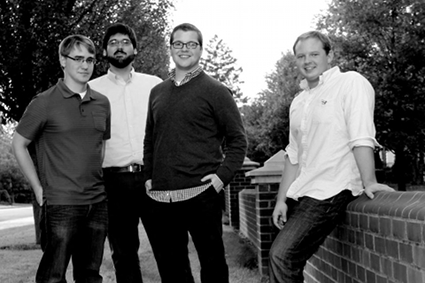Alumni Bloggers Redefine Progress
December 24, 2020


A group of Ashbrook Scholar alums have founded a new political blog called Right Progress. The founders of the website—2012 graduates James Velasquez, Dantan Wernecke, and Benjamin Kafferlin—see the blog filling a void in our current political debate, one felt especially by members of the “millennial” generation.
Last fall they felt their own dissatisfaction, and the general disaffection of their generation, in the just finished 2012 electoral process. Young people had not heard an inspiring message from either side of the campaign. “Obama no longer talked about hope and change; his tactic was simply to beat down his opponents. Romney was afraid to respond boldly, to argue the principled reasons for his views. The president won reelection while losing many of the millennial votes he won in 2008,” Velasquez said.
While the internet is crowded with websites championing every narrow political interest, there is no single site that recommends policies by arguing from first principles, Wernecke explained. The founders of Right Progress intend to offer a more comprehensive, discerning view of national policy. Some policies touted as progressive, Velasquez said, “are actually regressive—they’re wrong, not right.”
Besides ongoing current events, they outline four concerns their blog will address: “human dignity, cronyism, social entrepreneurship, and culture.” They have posted foundational essays to define each of these concerns.
“No system of government is going to work unless there is an underlying understanding that individuals do have rights that are to be respected,” Wernecke said, explaining why the blog first of all will address the too seldom mentioned idea of human dignity. Before addressing such topics as “religious liberty, or human trafficking—a big concern of millennials—and even abortion, and marriage,” Velasquez said, one must explain “what we understand human beings to be.”
By “cronyism,” the Right Progress bloggers mean the many ways that policies churned out by a sprawling government bureaucracy “elevate one interest group at the expense of the common interest,” Wernecke explained. Baroque in their complexity, “reforms” such as the Dodd-Frank legislation on financial lending and the Affordable Care Act disadvantage ordinary people who cannot figure out how they work. But specialist industries sprout up to interpret these bills and exploit them for financial advantage. Very often lobbyists have helped to write these laws in a way that benefits a particular industry. The Right Progress bloggers want to restore the principle of “equal rights for all, special privileges for none,” Wernecke said.
Under “social entrepreneurship,” the bloggers plan to highlight solutions to social and economic problems that rely on private efforts rather than government intervention. The millennial generation has been termed “globally conscious,” Velasquez says; “like young people of most eras, we hope to make the world a better place.” Private efforts have more success than government programs, he said, citing a Jamaican social entrepreneur who explained this in practical economic terms: small private enterprises cannot afford to construct large administrative processes to maintain a long-term “safety net” for the disadvantaged. “They want to quickly push people back up the economic ladder so that they will be self-sustaining.”
Finally, the bloggers want to give more serious attention to current culture than it generally receives. Of course, young people constantly use the web to follow pop trends, but Right Progress plans to discuss not just “what happens, but what it means.” Conservatives often “write off pop culture as not worth talking about, because it’s friendly to the left,” Velasquez said; “but we want to be more engaged in it.” There are truths to explore when examining such phenomena as superhero movies, Wernecke offered.
Overall, the project promotes a way of thinking about politics that the Scholars learned in the Ashbrook program: it “taught us to recognize the difference between ‘values’ and ‘principles’ and why it is best to argue from principles. Whereas a value is simply a preference, which can change at any time, a principle endures,” Wernecke said.
In so doing, they will spread an understanding of progress that is uniquely American. “The Ashbrook Center helped us understand our progressive founding as not just an inevitable historical development but an event unique in history. Because of our education we can see that the real progressive thing may be something that came before what is now called ‘progressive’—that set of policies developed by men who thought people had progressed beyond politics” and could now be ruled by experts, Velasquez said. “We learned as Ashbrook Scholars that no one is above politics, and that any attempt to unite the executive, judicial, and legislative functions in one place is by definition tyranny.”
At the same time, these alumni hope to offer a service to young writers who did not have the benefit of an Ashbrook education. “It is really easy today to write and post content using a service like WordPress,” Velasquez noted. “The hard thing is getting people to talk with you about your writing, to get help on learning to write effectively. We had this help as Scholars,” he said, recalling the open critiquing sessions that occurred when students submitted essays to the Ashbrook publication, Res Publica. All the writers met together to evaluate the anonymously submitted pieces. Then the essays were returned to their authors to be rewritten and improved. The editors of Right Progress have attracted about 25 writers, many graduates from other schools, and they work with each author on revisions.
The blog demands a significant time commitment. Kafferlin, who works for a DC-based consulting firm, serves as business manager for the team, while Wernecke, a Masters candidate in the Graduate School of Statesmanship at Hillsdale College, collaborates with Velasquez on the editorial work. Velasquez, who recently completed a fellowship in American Studies at the Heritage Foundation, is giving the blog much of his attention. “We recently hit a milestone—1000 ‘likes’ on Facebook,” he said.

